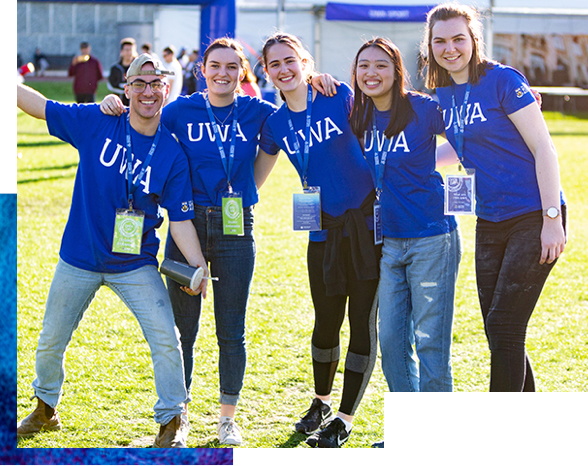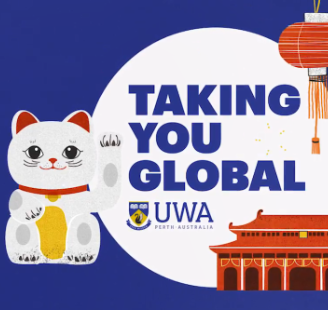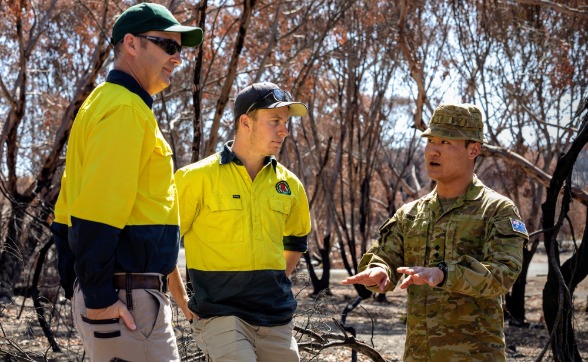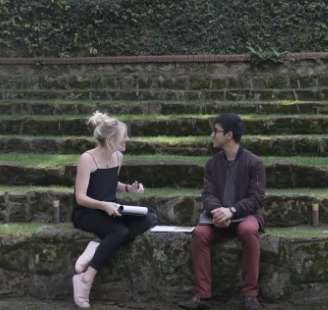Postgraduate
Master of International Relations
Contact us
Address
Student Central
The University of Western Australia (M355), 35 Stirling Highway, Perth, Western Australia 6009
Telephone
131 UWA (131 892)
International
(+61 8) 6488 1000
Hours
Frequently asked questions
Events you may be interested in
Show more eventsCareers and further study
Explore the career opportunities available to you.
Career Pathways
This course prepares you for careers in businesses and government departments with international linkages, agencies involved in regional or global governance and international non-governmental organisations. Expertise in international relations complements qualifications in a range of professional areas and is applicable to a variety of employment options.
Potential career opportunities include:
- Diplomat
- Policy Analyst
- International Policy Adviser
Further Study
Graduate opportunities
Our graduates have found employment at the following organisations:
- Perth US Asia Centre
- UN Sustainable Development Solutions Network
- ACFID Research for Development Impact Network
- Australian Institute for International Affairs + Young Professionals Network
- United Nations Association of Australia
- UWA Public Policy Institute
- UWA Centre for Muslim States and Societies
- UWA Africa Research and Engagement Centre
- UWA Confucius Institute
Fees and scholarships
Learn more about the fees that apply to you for this course.
Domestic Student Fees
For Commonwealth-supported places, student contribution amounts are charged by unit, based on area of study. For a fee estimate, go to the Fee Calculator and select “I want to price my units”. Fees are subject to annual indexation. Refer to the Handbook to identify the units required. More information on how fees are calculated.
Domestic Student Fees for Full-Fee Paying Places
If you're not eligible for a Commonwealth-supported places, you will be charged a for Full-Fee Paying place. For Full-Fee Paying places, students are charged an annual course fee, charged per credit point at a rate dependent on the course in which the student is enrolled. Annual course fees are calculated based on an annual study load.
Check the handbook to confirm the annual study load for your course. Visit the Fee Calculator and select your course type to find out more. Fees are subject to annual indexation. More information on how fees are calculated.
Scholarships
Scholarships are available to students from a diverse range of backgrounds, including academic achievement, financial need, educational disadvantage, leadership and community service, artistic or sporting achievements, and being from a rural or remote area.
Cost of living
International Student Fees
Onshore international students are charged an annual course fee, charged per credit point at a rate dependent on the course in which the student is enrolled. Annual course fees are calculated based on an annual study load. Check the handbook to confirm the annual study load for your course.
Find out more about international student tuition fees and visit the fee calculator for the relevant course fees.
Fees are subject to annual indexation.
Scholarships
Scholarships are available to students from a diverse range of backgrounds, including academic achievement, financial need, educational disadvantage, leadership and community service, artistic or sporting achievements, and being from a rural or remote area.
Cost of living
Admission requirements
If you’re interested in furthering your career by studying this postgraduate course, find out the admission details below
Admission Requirements
(a) a Bachelor's degree, or an equivalent qualification, as recognised by UWA;
and
(b) the equivalent of a UWA weighted average mark of at least 50 per cent;
and
(c) successfully completed prior study in a field relevant to International Relations; or
(2) completed a Graduate Certificate or Graduate Diploma in International Relations at UWA.
Ranking and Selection Process
English competency
English is the language of instruction and assessment at UWA and you will need to meet the English language requirements of the University to be eligible for a place.
Minimum overall IELTS score of 6.5, with no band less than 6.0.
How to apply

Ready for the next step?
Find out how to apply through our simple online application process.
We'll guide you through our entry requirements, admission pathways available to you and application deadlines for your chosen course.
We can’t wait for you to join us!
Course details
This course is subsidised for Australian residents through Commonwealth Supported Places (CSP). Visit our fee calculator for CSP rates and an estimate on your course fees.
About the course
Quick details
- Available
- Perth (Crawley campus)
- Full-time
- Part-time
- On-campus
- Semester 1, Semester 2
- 8-10 hours plus own study time
- Postgraduate
- 11580
- 069311D
Changing the world through international relations

Interested in leading diplomatic negotiations, developing foreign policy or tackling global crises? Find out more in Changing the world through international relations.
Put theory into practice
Current UWA students are eligible to take one of our professional experience units. These units bridge the gap between university and the workplace by providing opportunities to gain hands-on, practical experience. You can master new skills, make connections and network, get a taste of the opportunities in the workforce and add experience to your resume, all before graduating.
Find out more about Work Integrated Learning.

Course structure
Postgraduate coursework degrees and combined (coursework and research) degrees comprise a number of units. Refer to the course structure for more information.
Why study this course?
- Become an expert on the international relations and governance in our region and the wider global system
- Engage with our active networks of experts, policymakers and practitioners
- Study international relations while practicing international relations
- Undertake a credited internship at a local, national or international organisation
- Link theory to practice in relation to major powers, regional dynamics and global issues
Work Integrated Learning
- WILG5001 Professional Development Practicum: take a credited internship with a local, national or international organisation.
- POLS5105 International Relations in the Indian Ocean Region: A course capstone experience that engages students with regional peers and policy practitioners to study the International Relations in the Indian Ocean Region.
- Career information sessions with DFAT and other Australian government agencies.
Career opportunities
Career opportunities are available to students throughout the university semester.
- “Careers In…” series: career /industry information and networking sessions on careers in: foreign affairs; defence; the public sector; government; media; Asia; strategic communication; NGO and community sectors
- Professional development seminars: CV writing, public speaking, networking
- Professional placements linked to relevant industry (WILG5001)
- Weekly Political Science and International Relations research seminar series and other public events on campus
- Staff/student social networking events each semester
Our graduates have found employment in the following organisations:
- UWA Centre for Muslim States and Societies
- Perth US Asia Centre
- UN Sustainable Development Solutions Network
- ACFID Research for Development Impact Network
- Australian Institute for International Affairs + Young Professionals Network
- UWA Public Policy Institute
- United Nations Association of Australia, WA...and more!
You'll learn to
- analyse complex global problems
- develop expertise in policy analysis and writing
- link international relations theory to policy and practice
- conduct research in your field
- engage with professionals in your field
Alessandro Silvestri

Alessandro completed his combined Master of International Law and Master of International Relations. We caught up with him to find out about his time at UWA.
"To be honest, my favourite aspect was the calibre and competency of the lecturers and personnel that are involved with this program. I had never encountered people with such talent, passion and knowledge in International Law; lecturers such as Dr Melanie O'Brien and Dr Fiona McGaughey, in particular, instilled in me so much enthusiasm in international law and advancing its various disciplines that motivated me to pursue an academic career."
"Finally, and also very importantly, all people with whom I have had the pleasure of interacting showed me great humanity and understanding. In 2018, I was passing through a tough period of my life, but the support that I have received from UWA and, in particular, the members of the UWA Law School, gave me the strength to complete my degree with distinction. Choose law for the people."
"Building on the above, while I will not deny that the workload necessitates an important level of commitment and work, the opportunity that the UWA Law School offers is unique. You will have the opportunity to deal with some of the best people, both academically and on a human level, that you have ever encountered. It offers you the positive challenge to grow as a thinker and as a person in a nurturing and supportive environment."
"I am sure that everyone has, at some stage in life, wondered how and why we create and then respect the law. Law is the vehicle through which you can make changes happen and make our society a better place to live in. Choose law to be the change."
Articulated courses
This course is part of an articulated sequence with the:
Flexibility
We understand that life is busy. That's why our postgraduate courses are designed so you can balance your work and studies. Our flexible postgraduate experience includes the opportunity to study part time, a range of units that are taught after hours, and the option to learn via intensive units. Ask our Student Central team for advice on choosing the right postgraduate route for you. Find out more here.




